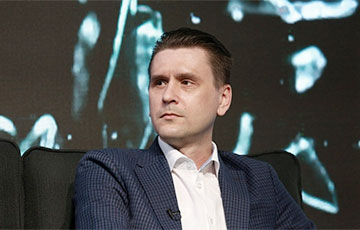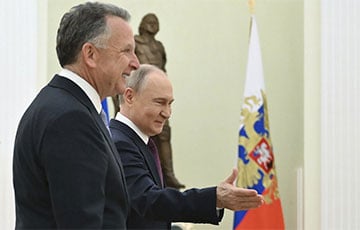Oleksandr Kovalenko: Belarusian Partisans May Further Explosions
3- 23.08.2022, 12:07
- 10,122

Occupation troops should not feel comfortable in Belarus.
Who is behind the blowing up of the Jeep of the daughter of the famous Kremlin ideologue Aleksandr Dugin? Why did Putin need to negotiate with Zelensky? How do explosions in Crimea influence the course of the war and should we expect similar explosions at Russian facilities in Belarus?
Charter97.org spoke to Ukrainian military expert and information operations specialist Oleksandr Kovalenko about this.
- As of today, we see how Russian propagandists are trying in every possible way to accuse Ukraine of allegedly being involved in this incident, let's call it that. However, this is an attempt to divert attention from the important things that are currently taking place among the Russian security agencies, namely the confrontation caused by the failures in the war in Ukraine. The fact is that Dugin is one of the ideologues of the so-called "Russian World", the foundation of which was laid both in the hybrid war against Ukraine in 2014 and in the current full-scale war. And the fact that he was under the constant supervision and patronage of such a structure as the Main Directorate of the General Staff of the Russian Armed Forces (roughly speaking, this is GRU) was also absolutely no secret to anyone.
Dugin also participated in a large number of special operations conducted by the Main Directorate of the General Staff of the Russian Armed Forces outside Russia. Through him, Marine Le Pen and practically all radical French elements that came onto the radar of the Russian special services were financed. Dugin was also directly involved in financing Matteo Salvini's "League of the North" in Italy. The fact that the Russian security services were involved in the financing of this political force was also made public after the publication in the Western media of audio and video recordings, as well as photo evidence of negotiations between the Main Department of Staff of the Russian Armed Forces, again with participation of Dugin, as well as of envoys of the "League of the North". This is, shall we say, the background, so that we can understand on whose field and in the interests of which power structures Dugin and his daughter, who completely inherited his activities from her father, were playing.
Now the confrontation between the FSB and the Main Staff Department of the Russian Armed Forces, which is a branch of the Ministry of Defence, has seriously escalated. We can see this in the regular aggressive outbursts made against the Ministry of Defence by the terrorist Igor Girkin, who is in fact a representative of the FSB. And now we see how the Jeep of Dugina, who was under the protection of the Federal Security Service, which is again a branch of the FSB, drives away from the car park, exploding a few minutes later. The question arises: if the Russian side accuses Ukraine of trying to eliminate Aleksandr Dugin together with his daughter, how could the Ukrainian special services have broken into the FSB-guarded car park, planted a bomb and organized the liquidation of these individuals in such a way?
In my opinion, the target was, in the first place, Aleksandr Dugin himself. And in the second place - it is a vivid example of how the fight between the security services of Russia is escalating, which is already turning into eliminating and destroying the undesirable figures. It is worth expecting a continuation.
- After Erdogan's visit to Ukraine, the media reported that Putin was ready to negotiate with Zelensky. Why would the Kremlin dictator need talks?
- We can see how the so-called "special military operation", which according to Russian military commanders was supposed to last three days or a week, has been going on for six months now. The Russian army is almost completely exhausted: not enough human resources, not enough technical resources. Today we see Russian commanders making requests to Belarus and obtaining permission from Minsk to remove ammunition from depots and storage centres. The Russian Federation is also getting access to artillery conservation and storage depots, and is involved in taking out units such as the 2S39, Nona-S, Giatsint-B and a whole range of other types of artillery. This suggests that ammunition and a number of types of hardware are becoming increasingly problematic for Russia.
Russia can conduct fairly intensive offensives in the near future, but there is a risk of losing the territories it temporarily occupies because it lacks the resources to provide defence measures. Therefore, it is critically important for the Russian Federation now to create conditions for freezing the conflict. And the conflict can be frozen by creating the appearance of some kind of negotiation process.
Russia does not need any negotiations, it does not intend to negotiate anything. This pause is needed only to restore more or less its combat effectiveness, the combat effectiveness of its units, and to recruit the necessary number of people to compensate for losses. But as we can see, voluntary mobilization in the Russian Federation is going on in a very poor and ineffective way, which is why Russia wants to create the appearance of being ready for some kind of negotiation process.
- Explosions at Russian military facilities in temporarily occupied Crimea have become increasingly frequent. How does this affect the course of the war?
- At present, it cannot be said that such explosions can play any decisive role. But it is true that they are affecting the rear support system, i.e. the deep rear. For the last month and a half, Ukraine has been exclusively engaged in destroying Russian occupying forces' facilities within a short-range radius of 70-80 kilometres. And that is the radius in which the facilities that play a role in the command and support system of the forward units have been destroyed. But anyway, there are also rear units and rear objects that also need to be destroyed in order to break down not just the support system of advanced or rear units but the entire support system.
For this very reason, it is necessary to increase the destruction of facilities beyond 70-80 kilometres in order to totally disrupt the capabilities of any kind of support at all levels. Crimea is currently the main transport hub through which vehicles, ammunition, fuel, lubricants and personnel are transferred from mainland Russia to the temporarily occupied peninsula for subsequent redeployment to the southern bridgehead. Excluding the Donbass bridgehead, which shares a border with the Russian Federation and where the redeployment of forces and assets takes place 24 hours every day, Crimea is the second most important site, a territory that plays an important logistical hub role. And if this function is broken, if the entire logistics in Crimea is disrupted, then the possibility of ensuring not only some counteroffensive or offensive actions of the Russian occupation troops in the southern bridgehead, but even their ability to hold defensive positions effectively, will be disrupted.
- Should Lukashenka be afraid of such explosions as well?
- In fact, from the first days of a full-scale invasion of its territory, Ukraine has taken a rather democratic and tolerant stance to the borders of neighbouring countries. Even taking into account the fact that this state is either a terrorist and war criminal (Russian Federation), or if this state is supporting this war criminal, for example, Lukashenka's regime in Belarus. We are not violating the borders of neighbouring states, we have demonstrated this to our international partners.
The only thing we can hope for is that the territory of Belarus will no longer be used by the Russian Federation in the interests of the criminal regime to shell Ukraine, I mean Ziabrauka, which has turned into a bridgehead for missile attacks on the territory of Ukraine, the hope in this case lies solely with Belarusian partisans. They can help with all sorts of explosions, detonations and blanketing smoke in the areas where the occupation troops are deployed.











